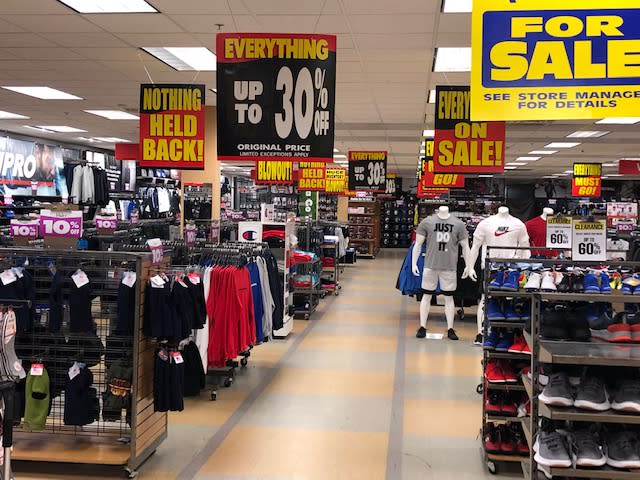Modell's CEO: Without tariffs, 'economy would have been a disaster’
Although “phase one” of the trade deal with China was signed last month, retailers are still dealing with tariffs on about $360 billion of imports from China still in effect.
Modell’s Sporting Goods CEO Mitch Modell believes the impact of the coronavirus on the U.S. economy would have been even more severe had President Trump not forced retailers to deal with the cost of the tariffs he imposed on Chinese imports during the trade war.
“Had the tariffs not happened, I think the state of the economy would have been a disaster,” Modell told Yahoo Finance.
The trade war forced many manufacturers to move their operations out of China. “There’s a lot of places, Dominican Republic, Mexico, places all over the world where they can make manufactured goods,” Modell said. Modell’s Sporting Goods has been in touch with its manufacturers on a daily basis to find out which goods they might have to replace in their stores.
Modell says footwear supplies are less of a concern for the company because the manufacturers they work with have already moved those operations out of China. Rather it’s the apparel and sporting goods that he’s more worried about, particularly popular items such as fleeces, sweatshirts, and sweatpants that are made in China. Modell says the apparel manufacturers the company works with are currently trying to relocate.
As urgent as the coronavirus situation has become for many retailers like Nike and Walmart, Modell’s financial struggles started long before the first case of the coronavirus in China was confirmed. The sporting goods chain flirted with bankruptcy in 2018 and suffered a $50 million loss in sales in 2019.
Several factors have contributed to the retailer’s financial struggles. “An unusually warm winter, the less-than-desirable performance of sports teams in our markets, increased occupancy costs as a percentage of sales, minimum wage increases, ever-changing technology. There are many factors that create a need for capital,” he said. Modell’s Sporting Goods operates 140 stores nationwide, mainly in the Northeast.

Another obvious challenge: competition from big-box stores and online retailers. “You look at the plays that are winning, are all value plays. We’re doubling down on value. That seems to be the formula when you look at the Walmarts, the Targets, the Costcos, the TJ Maxx, the Marshalls, the Five Below,” he said. “Those are the guys that are winning, and you know the guys that are caught in between are the guys that are struggling.”
Indeed, national retailer Sports Authority filed for bankruptcy protection and closed its stores in 2016. Modell says he’s also exploring the option of taking on a minority equity partner who could help Modell’s Sporting Goods compete in retail with more investment in technology and store experiences.
Last week Modell’s Sporting Goods announced it would be closing 24 stores. Modell announced that over the past couple of days he’s managed to save some of those stores and jobs. “We were able to work with a couple of landlords to re-open some of those stores that were on the close list, and we were able to save 98 jobs. We’re still working the phones as we speak. Before I came on the air, [I was] calling the landlords and seeing how they can work with us,” he said.
Modell bluntly said that if he’s not able to convince landlords to provide him with a 90-day grace period so that he can increase the company’s liquidity, Modell’s Sporting Goods will go bankrupt.
“We’re up against the clock,” he said. “If I don’t get complete support, I’m going to see [our creditors] in court. I’m trying to do everything possible to save 3,300 union jobs and to preserve the integrity of our relationships with our vendors and our landlords.”
Modell is the company’s fourth-generation CEO. Modell’s Sporting Goods was founded 131 years ago by Modell’s great-grandfather in 1889. “At the end of the day, our name is on the door and that’s enough incentive for us to do whatever it takes,” he said.
More from Sibile:
Tapestry CEO Jide Zeitlin talks diversity: ‘Talent comes in many forms’
How a publishing company started by a former slave has lasted for 120 years
Sallie Krawcheck tells women: ‘Sometimes it’s not you, it’s him’
Teen activist Marley Dias defends Greta Thunberg: ‘I get hate like that sometimes’
Millennials most likely to commit financial infidelity: survey



